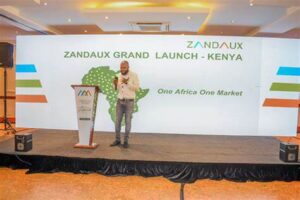Africa presents a puzzling paradox – a continent abundant in mineral resources yet grappling with profound poverty. The economic landscape of Africa is notably characterized by limited economic freedom, with no African country ranking among the top 20 in the 2023 Index of Economic Freedom by the Heritage Foundation/Wall Street Journal.
Despite its economic challenges, Africa has consistently attracted global attention for its vast opportunities in terms of population and natural resources. The persistent issue that policymakers and leaders face is the need for unification in both the people and the economy of Africa, coupled with a strategic rebranding to showcase its potential to the world and maximize trade value.
 image Source: Google Search Engine
image Source: Google Search Engine
While various regional economic communities (RECs) have been established, the African Continental Free Trade Agreement (AfCFTA) is seen as a pinnacle. Amid this seemingly gloomy scenario, Zandaux emerges as a catalyst for positive disruption, presenting a lasting solution with its visionary concept of “one Africa, one market” through a Business-to-Business (B2B) medium.
Franck Obambi Ngatse, Chairman, and CEO of Zandaux, expresses a singular goal – to unite African production on a single platform, ensuring seamless access to goods and services across the entire African market, regardless of the production location. Zandaux aims to bridge the gap and directly connect African factories and markets with the people.
In the perspective of Gabriel Idahosa, President/Chairman of the Council at Lagos Chamber of Commerce, addressing the critical issue of market disintegration in Africa is paramount. Zandaux envisions a borderless and less stressful market, offering consumers access to the African market and empowering businesses to leverage economies of scale.
The context of B2B commerce in Africa is explored, emphasizing the potential of digital-minded millennials and the projected growth of e-commerce. While global trends indicate a shift towards digital platforms in B2B commerce, Africa lags behind, with a mere 7% of online purchases in South Africa, leading the region.
Zandaux is positioned as an innovative platform with the ambitious goal of creating ‘One Africa, One Market,’ not only defining the trajectory of B2B e-commerce but also setting the pace for the future of B2B commerce in Africa. B2B commerce, involving the exchange of products, services, or information between businesses, is witnessing transformative changes globally, with traditional sales models giving way to digital platforms.
The B2B market’s growth is attracting significant players eyeing opportunities in Africa and the Middle East’s social commerce industry, with estimated revenue growth from $8.9 billion in 2022 to a forecasted $13.3 billion by 2028.
The evolving landscape of B2B commerce requires businesses to undergo digital transformation, adapting to changing customer behaviors, supply chain dynamics, and service delivery models. The expectations for B2B and B2C e-commerce are high, yet many online purchasing processes in Africa remain disorganized, with challenges in navigation, checkout processes, and mobile optimization.
Recognizing the need for a comprehensive approach that addresses these challenges, Zandaux emerges as a promising solution aligned with the global trends of increased digitalization and interconnected economies. The platform’s understanding of the issues plaguing the African B2B landscape, coupled with successful experiments and results across the continent, positions it as a catalyst for positive change in the realm of digital commerce.
News Source: Techeconomy

